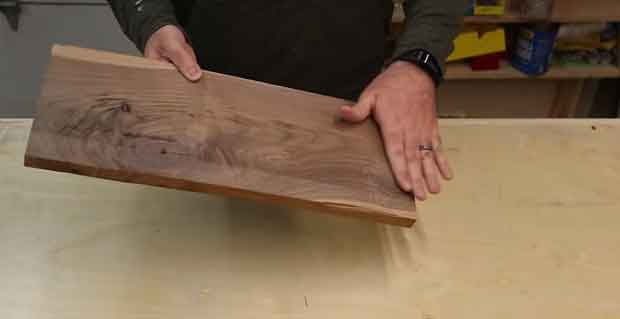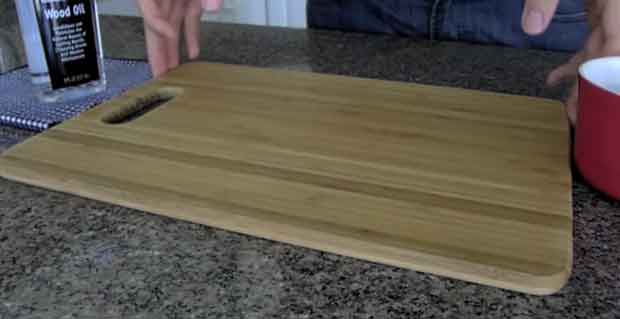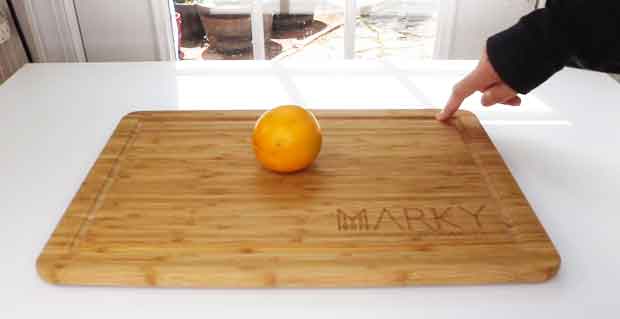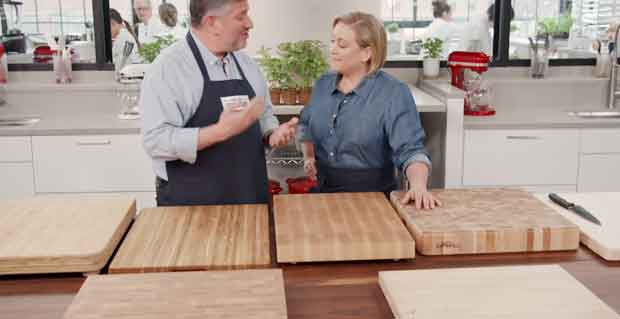Ever wondered what the difference is between bamboo and wood cutting boards? Or which one is better for your kitchen?
In this post, we will explore bamboo vs wood cutting boards. We'll examine how bamboo and wood differ in terms of their durability, versatility, safety, sustainability and cost.
Let's find out which board you should choose to maximize your kitchen space.
Wood Cutting Board

Wood Cutting Boards are made from a variety of types of hardwoods, such as maple and beech and can be more flexible than plastic cutting boards.
The thickness varies by the type of chopping board you're interested in using thinner boards. It is best to use thin knives to slice small vegetables or meats, whereas thicker ones are ideal for chopping large items.
Solid Wood Cutting Boards have a higher initial cost than bamboo ones. However, they are more durable and perfect for those who want their kitchenware items to last longer.
Bamboo Cutting Board

Bamboo Cutting Board is made from bamboo, which grows fast enough that it won't need replenishing at any point during its lifespan.
These boards are a superb choice for those seeking an ecofriendly item that can also be very practical for kitchen knives.
Bamboo products are preferred over plastic boards by many people. It doesn't hold bacteria like other woods might do if soaked or stored incorrectly.
It has natural antibacterial properties because of how porous bamboo fibers are. So no worries about food getting stuck and going bad.
Bamboo vs Wood Cutting Board
Which one should you choose? They both have their benefits so it's really up to you which board works best with your food preparation needs. Let’s dive a little deeper!
Related: Make Your Own Pasta Dough on a Pasta Board?
Talking About Durability
Bamboo Cutting Boards are more durable than wood cutting boards, but bamboo is a natural product that will eventually break down.
Wood cutting board material has the benefit of lasting for many years with no major wear and tear on it due to how hardwood cutting board is manufactured.
Talking About Versatility
When considering versatility, bamboo can be used for all kinds of different things, such as chopping vegetables or slicing raw meat.
It's also perfect when you need to cut smaller items like lemons and limes. Which aren't typically suited well with a wooden cutting board because they might get stuck?
Wood board is not so suitable because its flat cutting surface cannot provide space needed for those types of jobs since their bamboo counterparts are more flexible.
Talking About Safety
Wood Cutting Boards have a higher risk of harboring bacteria that bamboo boards don't because they're made with natural materials, which bamboo is handmade with bamboo.
Bamboo boards are much easier to clean. Only require a quick rinse with soap and water. While wood boards might require some scrubbing for those stubborn areas that just won't come off!
Talking About Sustainability
Bamboo Cutting Boards are a more sustainable choice as bamboo is made of 100% natural material, bamboo.
Wood cutting boards do not have the same ecofriendly qualities like bamboo ones. The hardwood boards and the built structure allow it to last longer.
Talking About Cost

Bamboo cutting boards cost less because bamboo is cheaper to gain and manufacture.
The bamboo boards are also a more ecofriendly choice because they need no replenishing or harvesting of new material during their lifespan, which will save you money in the long run.
Wood Cutting Boards are an expensive purchase when considering how durable they end up being over bamboo ones.
Pros and Cons of Bamboo Cutting Board
Bamboo Board Pros:
- Made of 100% natural material that's ecofriendly.
- Very easy to clean, requiring only a quick rinse.
- Naturally antibacterial
- Doesn't need to be replenished like wood does
Wooden Board Pros:
- More versatile than bamboo boards because of
- Flat and smooth surface
- Can be used for all kinds of different food items.
- Longer lasting than bamboo boards.
Bamboo Board Cons:
- Since it's natural and porous, it requires more maintenance
- Will eventually break down over time
Wooden Board Cons:
- Not naturally antibacterial like bamboo
- More expensive than bamboo cutting boards.
Few Common Questions
Here are some common questions that might come up for those who are considering a new cutting board.
1. What are the advantages of using a chopping or cutting board?
Answer: A chopping or cutting board is used to chop, slice, and dice raw food. A good quality kitchen cutting board should be made of a material that won’t dull your knives.
This also includes plastic, wood, glass and bamboo etc. boards that are designed for the kitchen with no risk of damaging your knife blades while slicing through them.
The surface area needs to have enough room so you can move items around without risking cuts or slips.
2. How do I choose the right cutting board?

Answer: There are many factors to consider when picking the right cutting board.
Material
Bamboo and hardwood are pleasant choices because they won't dull your knives. If you're looking for a plastic cutting board, be sure to get one that's thick and durable enough for your use.
Size
The size of your cutting board will depend on how much space you have in your kitchen. If you're limited in space, then a small cutting board is the way to go.
Price
You want to make sure you're getting an excellent quality cutting board, but also one that's in your budget.
3. Does the choice of cutting board affect the cutlery?
Answer: If you use a very sharp knife, then a bamboo board is the best choice.
Otherwise, if your knife blade isn't so sharp and might need some work to prep things like vegetables or meat for cooking wood cutting boards are more suitable. They can take on a lot of abuse without breaking down easily.
Is it possible to use both sides of a cutting board?
It is possible to use both sides of a cutting board. It will depend on the type of material you have (wood, bamboo or plastic).
However, they may be used for individual purposes. For example, one side is for meat and the other side is for vegetables.
4. How do you choose the most sanitary cutting board?
Answer: Cutting boards are sanitary because they are antibacterial.
Bamboo boards are made of 100% natural material. That's ecofriendly and naturally antibacterial without needing to be replenished like wood does.
This means you will have fewer bacteria on your surface than with a wooden cutting board. Which won’t need replacing or refurbishing for the length of its lifespan? It may require more maintenance to keep it clean.
Wooden boards are not naturally antibacterial like bamboo. However, they will last longer than bamboo cutting boards.
5. Is cutting board oil necessary?
Answer: There are some cutting boards available that come with oil for the board. This is unnecessary to use in order to keep your board sanitary or fresh.
It's more of a luxury item that makes your board easier to clean and maintain. It also helps prevent food from sticking to it.
6. Why are wood cutting boards more popular?
Answer: Wooden boards are more durable and give a nicer, cleaner cut than plastic boards while glass cutting boards can be risky to keep.
They’re also made from renewable resources (wood). Which is better for the environment versus petroleum based plastics. It can leach toxic chemicals into food products.
It doesn't have any type of odor or color like some types of plastic board can.
It also doesn't have any type of coating on them like some types of plastics do, which could get into food and be ingested.
Wood cutting boards are a better choice for those who may suffer from allergies or intolerances to certain foods.
7. What makes bamboo a good cutting board?
Answer: We love to cook and we also love sustainability. That is why we use bamboo for our cutting boards. Bamboo holds up well in the kitchen. It does not splinter like many other types of wood, which can be a safety hazard.
It's also naturally antibacterial and renewable, making it a logical choice for the health conscious cook.
Last Thoughts
In this article, we learned about the pros and cons of using both bamboo cutting boards or wooden ones.
Bamboo cutting boards are made from 100% natural material that's ecofriendly. They're also easy to clean with a quick rinse after use because they need no replenishing unlike wood. It needs constant care in order to stay as durable as it is when you first purchase it.
Wooden boards have more versatility than bamboo by providing a smooth surface for all kinds of different food items while being able to handle abuse without breaking down easily.
Last, one thing that makes bamboo such an attractive option over other types of woods is how naturally antibacterial it is. While cutting boards made from wood are more durable because they are well built.
Ultimately, your choice depends on your needs and situation. Keep in mind that it all depends on how you prioritize it according to durability, versatility, safety, sustainability, and cost.



